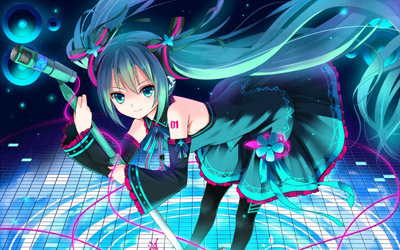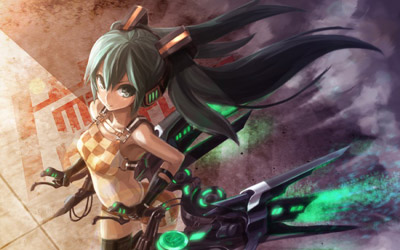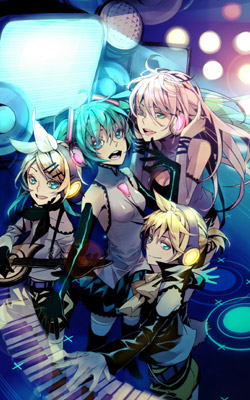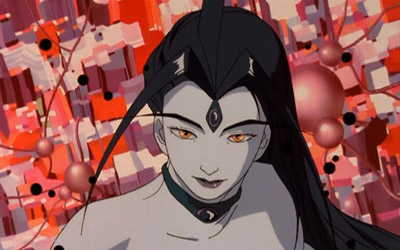Virtual Idols and Hatsune Miku

Recently, renowned sci-fi writer William Gibson of Neuromancer fame annoyed a bunch of Miku fanboys when he tweeted, “Hatsune Miku doesn’t really rock me. I want higher rez, less anime.” This was immediately parsed by some to mean that he hates all things anime and wishes horrible things to happen to otakukind and hilarity ensued.
Coincidentally, I have been spending some time thinking about the concept of virtual idols recently and just picked up a copy of Gibson’s Idoru novel that touches on this exact issue. Incidentally, it has a pseudo anime-style cover.
While Gibson’s delivery of his message was highly ambiguous (we can all thank the ubiquity of Twitter in contemporary discourse for that), I think what he actually meant by his statement is that he believes a true virtual idol should emulate reality to a higher level of accuracy. This of course includes higher resolution graphics and the display technology to match it. I think there is some merit to that argument that goes beyond a matter of personal preference.
Idols throughout history have always been artificial constructs to varying degrees, but today idol-making has become a precise science. Outfits like Johnny’s and AKB48 assemble each idol from a list of proven ingredients and find a suitable host body to bring theory to life. They are basically idol factories, managing hundreds of manufactured personas and with hundreds more on a conveyor belt ready to replace them. These idols are actors whose talents are not singing or dancing but to give the fans exactly what they want to see. Auto-Tune fills in the rest.

The real game we are playing is the illusion of intimacy. The best idols are not the prettiest or the best singers, they are the ones who can convince the most number of people that a special connection exists between them and their fans.
This argument may sound overly cynical, but it’s only slightly. I’m not saying that all idols are being intentionally deceitful in order to be popular (only most of them), and indeed many of them probably truly believe in what they do and say in front of their fans. Some of them may even feel the special connection. But that all just means that even idols themselves are human beings who are susceptible to the alluring mirage of false intimacy.
I suppose the more astute reader would now argue, “But DM, by that line of reasoning is there really such a thing as real intimacy?” Let’s not open that can of worm, but I’ll just quickly add that at the very least, I think that real intimacy cannot possibly arise from a relationship in which communication is mostly unidirectional and systematically managed.

Now the problem I have with the idea of Hatsune Miku as an “idol” is not the art style or her glass-shattering voice, but the difficulty of maintaining this illusion with what is essentially an open-source meme. Her screen-projected concerts are not so much endearing as amusing; It’s something fresh and flashy, but after the first time it offers no obvious value over watching this YouTube video twenty times. That’s because seeing Hatsune Miku as an idol requires a suspension of disbelief far greater in magnitude than that required for a typical mass-produced humanoid idol. This is why virtual idols (and I suppose this does include anime characters in general) will remain a tiny niche for as long as display and rendering technology fail to convincingly fool our brains into giving willing fans an easier time to live in our selfish fantasies.
Of course, my obsession with the idea of emotional intimacy as part of the definition of an idol is subjective and probably too stringent for some. However, I find the distinction significant because a line, hard to define as it may be, must exist somewhere between regular fame and idolatry, or the concept of idol ceases to have relevance.

This reminds me of my current addiction: Valkyria Chronicles 2
In addition, the crowd-sourced nature of Hatsune Miku further complicates the situation. Everyone can participate in the creative process and all works produced can potentially be incorporated into the collective idea of what exactly constitutes Miku. The trademark leek she holds for example originated from a Bleach parody video. Given that idols, according to my cynical worldview, consciously calibrate their self image in a way that panders to fan expectations, letting fans have direct creative control over the entire process should arguably represent the ultimate form of idol creation, at least in theory.
I am undecided on this one, but I lean towards scepticism. If fans get exactly what we want because we helped to create it, doesn’t that just makes it more difficult for us to maintain the illusion that the virtual idol is an existence worthy of our worship? After all, how can the creator idolize his creation when he can see all through all the magic taking place behind the scene?
Personally, I see Hatsune Miku as a meme. The sense of joy we derive from watching her comes from shared experiences between fans more than it comes from her. It’s more like an open-source software community where everyone contributes something and we all feel happy with the result and less like Steve Jobs coming up with an awesome iThing and we all grovel at his feet. There are tons of shaky bits in that analogy, but I think it conveys my general feeling.

So that’s why they named her Apple…
So all in all, I do not see Hatsune Miku as a virtual idol. She’s more like the Laughing Man except less anarchistic and more merchandising. But in all likelihood, the idea of idol itself may be the one that is changed in this great social experiment. We’ll see.
Actually, I wonder why no one has yet to make a serious attempt at manufacturing a classic virtual idol. We already have the technology to render photorealistic people (at least for the purpose of making music videos or advertisements). Throw in some anonymous voice samples with Auto-Tune and some masked body doubles for concerts (perhaps even special effects make-up or plastic surgery) and you have an everlasting star who will work for as long as you need and who will never betray your corporate interests… Hmmm.
As for William Gibson, he eventually tweeted a follow-up message and said, “Hatsune Miku is clearly a more complex phenomenon than I initially assumed. Requires further study.” I wonder if he truly believes that or if he’s just saying that to get the fanboys to get off his back.
P.S. It’s interesting to note that a lot of Miku fan art is basically recoloured/traced illustrations of other anime characters. Perhaps Miku is more like the Borg: she absorbs and assimilates all our individual fantasies…







November 23rd, 2010 at 10:56 pm
Ze brog ate my post, so I’ll paraphrase from memory–
There’s an overlap between “idol” and “character.” Hatsune Miku is a character, what makes her popular is what makes idols popular. Of course different people appropriate and appreciate different things from real-life idols and characters, so virtual idols will not appeal to everyone. But a large portion of people will appreciate both.
The thing is, you already missed the boat when it comes to the really creepy idol otaku types, who is all about appropriating the identity of the idol for self consumption. In a way, a well-produced idol is just a plausibly realistic fiction. Hatsune Miku is a DIY character. if the fact that one is only an idea doesn’t bother you, then there’s no difference between the two. Basically:
This is wrong in two ways. First off, Hatsune Miku isn’t “exactly what we want.” Second, to answer the question, only sometimes.
November 23rd, 2010 at 11:01 pm
If there were Miku animes/live appearances it may actually become a successful idol in its own right. People prefer human-esque entities with real – or what seems to be real- personalities and leekspin and a couple of youtube videos just isn’t enough to cement Miku’s popularity with the mainstream crowd.
It’s like how people idolise anime characters. They appear in settings which allow them (in most cases) to fully showcase their “personalities”, quirks and all, and thus develop fanbases akin to those of real human idols.
November 24th, 2010 at 12:16 am
omo:
I think that on some level all fans appropriate the ideal of their idols for self consumption. That is what the false intimacy play appeals to. A virtual idol should therefore seek to emulate that.
Miku does not manage to do that, and so can only gain the idolization of what you characterize as really creepy idol otaku types, i.e. people who have the ability to fill in that gap themselves with imagination alone. This I think is a fringe area in the idol market.
In any case, by the measure of “plausibly realistic fiction”, most anime characters would be considered virtual idols, and most of them more qualified at it than Miku. But that makes the whole definition of “virtual idol” meaningless in discussions relating to Miku.
The fact that the comparison is only being made for Miku is I think an indication that the “virtual idol” people talk about in this context is one that serves as virtual replacements for real idols. What you described is more of a separate concept of idols who are virtual. (I’m not sure if that makes sense…)
I think that the reason why people make this comparison for Miku is probably related to the fact that she has a synthesized voice and shows promises of future virtual idols in the traditional cyberpunk sense.
Basically, my point is that your definition is too broad and while it qualifies Miku as a “virtual idol”, it simultaneously renders the term meaningless in comparison to other “virtual idols” that basically comprise of all anime characters ever.
November 24th, 2010 at 1:59 am
I would argue that Gibson, with his prolific career in science fiction, may have missed the point with virtual idols. The debate here, isn’t so much about “resolution” or anime, or even how much of physical reality is simulated in these artifical bodies. Rather, I tend to think that Hatsune Miku represents an aesthetic advancement in the development virtual bodies. On other words, the fact that she even has a fan community indicates that various factors such as anthropomorphism and/or the uncanny valley (http://en.wikipedia.org/wiki/Uncanny_valley), are working to create an “idol” that is radically different from its conventional counterpart (i.e. the physical body of a pop star/actress)
A significant example illustrating this point would be Hatsune’s predecessor, Yuki Terai. Compared with Hatsune’s moe cuteness, Yuki certainly had a higher level of photorealism in her image. The question is, why did the industry regress to someone that looked less “human” such as Hatsune Miku?
My guess is, within the context of Japanese pop culture, it is easier to develop a fondness for an anthropomorphic object such as Hatsune Miku. This is because the realism embodied in Yuki Terai, if it were to progress further, would cease to appeal to human viewers.
November 24th, 2010 at 6:52 am
But many anime and game characters have fan communities. Is Miku really an advancement?
November 24th, 2010 at 6:48 pm
Interesting post, DM. Subjective though your opinions may be, they nonetheless provide an attempt to define the Miku phenomenon within the confines of what we understand as “idols” today.
Idols and idol groups (the most recent ones I know of being Korean girl-groups) have always had little trouble appealing to a wide fanbase without requiring any real talent in singing or music making. Indeed, many fans don’t even understand the language they are singing in. The dynamic between Miku and her fans, I feel, is significantly different. The vast majority of Miku fans only like a fraction of her entire discography (if it can be called that), and the only people who would be enamoured of all her songs (and her) without regard of which song it is (like most fans of real idols) would be those most hardcore of otaku.
Miku as a virtual idol, and whether it really works, is hard to qualify and define simply because Miku doesn’t fit the mold of idols as we know it today. She may yet carve out a niche for herself, with a new definition of what she is, but whatever that may be, I doubt it will be what we have imagined a virtual idol to be.
November 24th, 2010 at 9:54 pm
>> Miku does not manage to do that
How? Wouldn’t your claim about Miku’s meme-community nature indicate that she does that better than any other idol?
>> so can only gain the idolization of what you characterize as really creepy idol otaku types, i.e. people who have the ability to fill in that gap themselves with imagination alone. This I think is a fringe area in the idol market.
I don’t think this matters. Real idol fans in Japan is also a very fringe category. But more importantly I think what you’re trying to say addresses her transhuman nature than the fact that she may be an idol. But that is still no big deal. You can be a successful idol without appealing to every single human being.
>> In any case, by the measure of “plausibly realistic fiction”, most anime characters would be considered virtual idols, and most of them more qualified at it than Miku. But that makes the whole definition of “virtual idol” meaningless in discussions relating to Miku.
No, that’s just you being obtuse. The reason why Miku is considered an idol is because of her sing-dance-”tarento” aspect of how the press and the “outside world” view her. Hello Kitty and Mickey Mouse both are similar to her, it’s just that they fill different gaps as far as entertainment industry’s roles for celebrities.
The point about character, though, is true to an extent. It’s a postmodern 101 sort of criticism about the entertainment industry. Of course, most anime characters are tied to a story, and they don’t escape it. Miku is unique in that she is her own sort of thing (like Hello Kitty etc).
>> Basically, my point is that your definition is too broad
My definition is not broad at all. I have a very specific definition of what are idols. I think it’s just you may not agree with me about the manufactured image of real-life idols. To me they are almost just as fake as Miku’s hologram.
November 26th, 2010 at 12:59 am
Hoho. Very interesting post DM. I don’t think it’s overly cynical to call the lure and trap of intimacy with an Idol completely forged and fake. However, that’s simply from our point of view. The fact that their fans feel the intimacy, however, is not a lie. From the fan’s point of view it is very real, and it’ll remain that way forever as long as the idol doesn’t crack up or we cynicists don’t shatter their dreams. Isn’t that fine? We shouldn’t destroy the illusions of another just because we can, and we think they should be miserable and disillusioned like the rest of us. That’s why while it’s completely true that the intimacy is false, it’s wrong to call it that.
But. Enough of that. Isn’t Hatsune Miku as popular as she is precisely because she’s both an idol and a character? A character from an anime is popular because they have a set personality that never changes and never fails. That’s why anime otakus can go so crazy, because they know that their favorite character is “perfect”. DM, if you’re right about how Idols are manufactured based on what the community would most like, that the fans themselves have a degree of unconscious control over what their idols are like, then wouldn’t Hatsune Miku be the perfect cross? If we the fans created Hatsune Miku, then she would be the perfect Idol. The same fan fervor that makes Idols so popular would be in effect, except that this idol would never age, would never crack up, as all real life idols do.
The reason she’s still a niche is due to two problems with this theory. First, there’s the uncanny valley. She’s still a niche for the reason anime is still a niche, most people just cannot relate to a character (or something like that, I wouldn’t know, I’m not one of those people). The other problem is that idol and the character conflict a bit in Miku’s case. She IS a bit like open-source software, anyone can contribute what they like. The reason that’s a problem is because not everyone likes what everyone else is contributing. This is in contrast with an actual anime character, where the character’s personality is almost completely set in stone by the anime.
If. If idol companies started turning out virtual idols the same way they turn out human idols right now, and the uncanny valley is overcome, maybe the perfect idol would be made. Then again, maybe not. Maybe the thing that’s so appealing about Miku is that she is almost completely fan-made. Maybe a virtual idol with a set personality created by an idol manufacturer would completely lose all the charm that vocaloid has. It’s completely impossible to predict the future, isn’t it?
November 26th, 2010 at 4:35 am
>that’s because seeing Hatsune Miku as an idol requires a suspension of disbelief far greater in magnitude than that required for a typical mass-produced humanoid idol.
Ridiculous.
>true virtual idol should emulate reality to a higher level of accuracy.
Phooey. 2D > 3D (actually, that is inaccurate now since there are 3D projections of Miku. Really should say drawings > real life)
Trackback from
Omonomono » Transhuman Idol, for RealsNovember 26th, 2010 at 8:43 am
[...] DM posted some observation about Miku Hatsune, thanks to William Gibson. I think I still have to finish Mona Lisa Overdrive, dropped it like a fifth of the way through. But this was like, 1999. [...]
November 26th, 2010 at 10:06 am
Ruling out crowdsourced idols is basically arguing a manager is a precondition of idol status, a concept I think will be seen as increasingly quaint in the future. Some of the scepticism you express seem to stem from being stuck on Idol 1.0 as the reference point instead of being ready to acknowledge the changes made possible by Idol 2.0. Flesh and blood idols are affected by real-life constraints, which shouldn’t be mindlessly emulated in the name of accuracy. Why shouldn’t virtual idols have additional means for reaching out to fans? Crowdsourcing is one of those ways of doing things differently and arguably one of the ways Miku differs from cartoon characters.
I strongly suspect that on a practical level this kind of hairsplitting will be moot in the future. We will see both crowdsourced and “traditionally” managed virtual idols, and people will readily acknowledge the idol status of both. Whatever works, will be the attitude. Besides, whether the studios like it or not, fandom is likely to turn their managed idols into crowdsource hybrids. The easy availability of realistic animation and voice programs will lead to a thriving fan industry of skinning, sampling and mixing managed idols. Canon it may not be, but to varying degrees it will influence how people relate to this and that studio idol.
Finally I’ll throw the odd spanner in the works. Shinto religion claims as a matter of faith that even inanimate objects have spirits in them. A number of commentators in the west have already posited that the positive view of humanoid robots in Japan is influenced by a worldview conditioned by Shintoism. Even a Japanese atheist is going to be affected by the culture he grew up in. Perhaps we with our Judeo-Christian cultural blinkers are predisposed to view constructs as fundamentally inanimate, so we have a hard time gauging how Japanese fans might relate to something like Miku.
Trackback from
a word on idolatry « lelangiric v2November 27th, 2010 at 5:05 am
[...] can read what omo and DM have [...]
December 1st, 2010 at 7:13 pm
Omo:
Essentially, I do not see any fundamental difference between Miku and, say, Lynn Minmay, Haruhi or K-On! in terms of their “idolness”. I agree that people do see them as virtual idols in some sense, so we can certainly call them “virtual idols” if we feel like doing so. I am not actually opposed to this.
The thing I fail to see is what exactly is the “advancement” brought about by Miku over anime characters like Haruhi or the K-On girls to the point where we should proclaim that virtual idols are finally here, when they (idolized female anime characters) have been here for years if not decades.
The only substantial difference between Miku and the rest as far as I can see is her crowd-sourced development. This makes her a popular meme similar to Hitler Downfall videos and lolcats, and I think that that is the source of her popularity. Without the user-generated memes, she would not have become popular. While I agree that this unique attribute of hers is new and Web 2.0, I fail to see how it makes her more qualified to be a virtual idol over Sheryl Nome.
Perhaps the argument is that she exists outside of an anime, but I still fail to see what difference that makes. Does that make OS-tans idols too?
KC:
I actually agree that drawings appeal to fantasies more easily. But if you are arguing that that is what makes Miku special, then she is decades late to the game.
Jane’sTanksofWorldWarII:
You have to tell me what is “Idol 2.0″. Is it just idols plus crowd-sourcing? But I suppose my thoughts were kind of meandering on that point. Let me try to fix it.
Let’s say that being the product of a crowd-sourced effort does not preclude one from being qualified to be an “idol” (which it probably does not, but I am still sceptical about the appeals of products produced in this way). Given that past idols were not the products of crowd-sourcing, crowd-sourcing is clearly not an indicator of idol status either.
So what exactly is the qualitative difference that makes Miku a virtual idol? And what’s new about it?
I see Miku as an evolution of anime idols and community-generated memes. This certainly makes her a “virtual idol”, but it brings nothing new to the table.
What I don’t see is her replacing traditional idols in niches where they have not already been replaced by anime characters. That I believe is the original raison d’être of “virtual idols” in cyberpunk.
December 2nd, 2010 at 1:17 am
The way I see it, Hatsune Miku is to idols what Dadaism was to Art: a conscious rejection of the validity of idols leading to a reaction where idols themselves are subverted as signs and symbols that look even more ridiculous. Yet people still thought Dadaism was art, just as how some people now treat Hatsune Miku as an idol rather than a program. Of course the supposed intentions of the creators are different but somewhere along the line the notion of creators being able to replicate an idol, that duplicity of “idol-ness”, has replaced the aesthetic value that idols(singing ability) once had. The unique “aura” of idols, in this case their uniqueness in capturing the hearts of viewers, could have been traded-in for a duplicity as found in the widespread creation on NND.
December 2nd, 2010 at 3:20 pm
By “advancement”, I do not mean that Miku has become an improvement of the virtual object, or that the technology underlying her production is more sophisticated than earlier types of virtural idols. I would agree with you that relative to the domains of realism or technological innovation, Miku does not bring anything new to the table. However, when I examined the developmental trajectory of virtual bodies on their own terms, a couple of interesting observations came to mind:
First, Miku is less a simulation of the physical body than a caricature of it. In fact, if you compare her anatomically with Yuki Terai, Miku can even be an inferior form of virtual girl. How is it possible that a digital character that deviates so significantly from “real” human beauty, can appeal to human viewers in a similar fashion? One can claim that style is distinct from physical beauty, but I would argue here that unlike the Mona Lisa, virtual idols and game characters (composed of bodies that are designed in the same vein), actually attract and interact with human consumers, in the same way one would respond to the image of Megan Fox or a Victoria Secrets Angel.
So this leads on to the next find, that virtual bodies are not attempting to replace, or even emulate the human body. Rather they are simply animated objects possessing anthropomorphic qualities. It’s similar to other kawaii icons such as hello kitty, but with the element of human-interface interaction added into the mix. A broader question to consider would be how the simultaneous humanisation and objectification of such images would alter our own idealisations of beauty and desire…
December 4th, 2010 at 4:48 pm
“Personally, I see Hatsune Miku as a meme. The sense of joy we derive from watching her comes from shared experiences between fans more than it comes from her. It’s more like an open-source software community…”
To go back to an older example, I think that Miku is perhaps in a sense an idol in the ancient, pagan sense of the term. Actually, the whole nature of the vocaloid community does put one in the mind of ancient mythology, where you likewise had many interpreters and story-tellers at work yet having a discrete body of “canon” myths that would resonate with people and survive through repeated tellings. The totem of wood and precious metal has just been replaced by glass and light in this case…
Trackback from
Seeking Hatsune Miku « Seeking Hatsune MikuJanuary 20th, 2011 at 9:02 am
[...] Vendredi. “Virtual Idols and Hatsune Miku.” A comment posted to Dark Mirage’s blog on 4 Dec. 2010. Blog posted on 23 Nov. 2010. Web. 23 Dec. 2010. </websites/www.darkmirage.com-pre/2010/11/23/virtual-idols-and-hatsune-miku/>. [...]